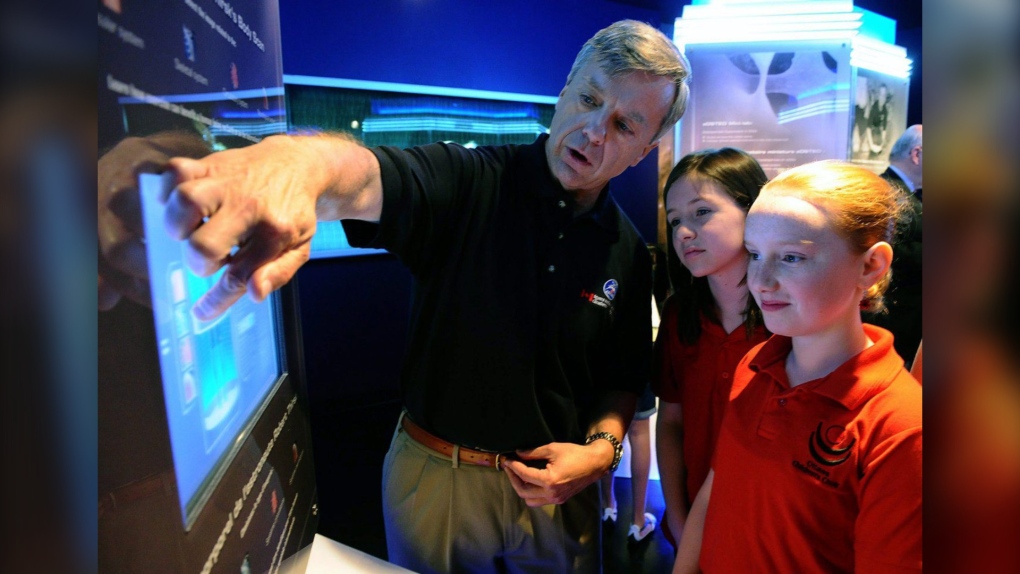'Permanent bone loss': Calgary study finds astronauts suffer on return to Earth
 FILE - Canadian astronaut Robert Thirsk talks with students from Rockcliffe Elementary School as they get a first look at The Living In Space exhibit during its unveiling at the Canadian Aviation and Space Museum in Ottawa on Thursday, May 12, 2011. (THE CANADIAN PRESS/Sean Kilpatrick)
FILE - Canadian astronaut Robert Thirsk talks with students from Rockcliffe Elementary School as they get a first look at The Living In Space exhibit during its unveiling at the Canadian Aviation and Space Museum in Ottawa on Thursday, May 12, 2011. (THE CANADIAN PRESS/Sean Kilpatrick)
The experience may be out-of-this-world but research indicates those who travel to outer space suffer from increased bone loss.
A study released Thursday from the Cumming School of Medicine at the University of Calgary followed 17 astronauts before and after their space flights.
The TBone study, conducted over a seven-year period starting in 2015, found that prolonged weightlessness accelerated bone loss in the astronauts.
"We found that weight-bearing bones only partially recovered in most astronauts one year after spaceflight," said Dr. Leigh Gabel, an assistant professor in the faculty of kinesiology and lead author of the study.
"This suggests the permanent bone loss due to spaceflight is about the same as a decade worth of age-related bone loss on Earth."
The researchers travelled to Johnson Space Center in Houston to scan the wrists and ankles of the astronauts before they left for space, on their return to Earth then after six months and one year.
The findings, published in Scientific Reports, said the loss happens because bones that would normally be weight-bearing on Earth, such as the legs, don't have to carry weight in a zero gravity setting.
"We've seen astronauts who had trouble walking due to weakness and lack of balance after returning from spaceflight to others who cheerfully rode their bike on Johnson Space Center campus to meet us for a study visit," said Dr. Steven Boyd, director of the McCaig Institute for Bone and Joint Health and professor in the Cumming School of Medicine.
"There is quite a variety of response among astronauts when they return to Earth."
The study found some astronauts who flew on shorter missions, under six months, recovered bone strength and density in the lower body compared to those who flew for longer durations.
As future space missions are exploring travel to more distant locations, the study's next iteration plans to look at the effects of even longer trips, to support astronauts who may one day travel beyond the International Space Station.
The University of Calgary's former chancellor and astronaut, Robert Thirsk, said he knows how difficult it can be to be back on solid ground.
"Just as the body must adapt to spaceflight at the start of a mission, it must also readapt back to Earth's gravity field at the end," he said.
"Fatigue, light-headedness and imbalance were immediate challenges for me on my return. Bones and muscles take the longest to recover following spaceflight. But within a day of landing, I felt comfortable again as an Earthling."
The study was funded by the Canadian Space Agency in partnership with the European Space Agency, NASA and astronauts from North America, Europe, and Asia.
This report by The Canadian Press was first published June 30, 2022.
CTVNews.ca Top Stories

Widow looking for answers after Quebec man dies in Texas Ironman competition
The widow of a Quebec man who died competing in an Ironman competition is looking for answers.
Tom Mulcair: Park littered with trash after 'pilot project' is perfect symbol of Trudeau governance
Former NDP leader Tom Mulcair says that what's happening now in a trash-littered federal park in Quebec is a perfect metaphor for how the Trudeau government runs things.
World seeing near breakdown of international law amid wars in Gaza and Ukraine, Amnesty says
The world is seeing a near breakdown of international law amid flagrant rule-breaking in Gaza and Ukraine, multiplying armed conflicts, the rise of authoritarianism and huge rights violations in Sudan, Ethiopia and Myanmar, Amnesty International warned Wednesday as it published its annual report.
Photographer alleges he was forced to watch Megan Thee Stallion have sex and was unfairly fired
A photographer who worked for Megan Thee Stallion said in a lawsuit filed Tuesday that he was forced to watch her have sex, was unfairly fired soon after and was abused as her employee.
Amid concerns over 'collateral damage' Trudeau, Freeland defend capital gains tax change
Facing pushback from physicians and businesspeople over the coming increase to the capital gains inclusion rate, Prime Minister Justin Trudeau and his deputy Chrystia Freeland are standing by their plan to target Canada's highest earners.
U.S. Senate passes bill forcing TikTok's parent company to sell or face ban, sends to Biden for signature
The Senate passed legislation Tuesday that would force TikTok's China-based parent company to sell the social media platform under the threat of a ban, a contentious move by U.S. lawmakers that's expected to face legal challenges.
Wildfire southwest of Peace River spurs evacuation order
People living near a wildfire burning about 15 kilometres southwest of Peace River are being told to evacuate their homes.
U.S. Senate overwhelmingly passes aid for Ukraine, Israel and Taiwan with big bipartisan vote
The U.S. Senate has passed US$95 billion in war aid to Ukraine, Israel and Taiwan, sending the legislation to President Joe Biden after months of delays and contentious debate over how involved the United States should be in foreign wars.
'My stomach dropped': Winnipeg man speaks out after being criminally harassed following single online date
A Winnipeg man said a single date gone wrong led to years of criminal harassment, false arrests, stress and depression.
































